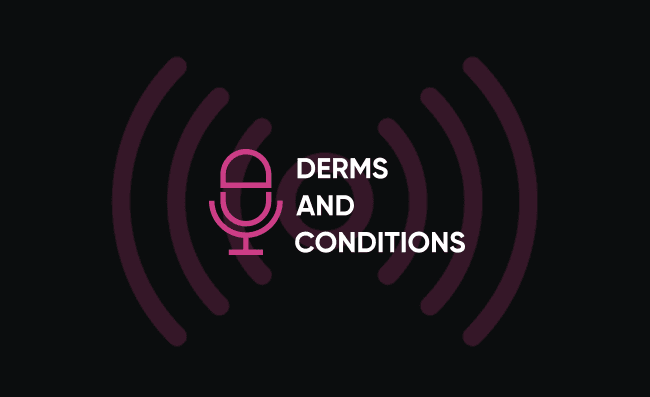Derms and Conditions Podcast Episode 64:
Beyond the Knife: Practical Nonsurgical Options for Skin Cancer
Featuring Shane Chapman, MD | Release Date: November 21, 2023
In Episode 64 of Derms and Conditions, our host, Dr James Q. Del Rosso, sits down with Dr Shane Chapman, Chairman of the Department of Dermatology at Dartmouth Hitchcock Medical Center, to discuss nonsurgical approaches to treating nonmelanoma skin cancer.
Dr Chapman begins by discussing topical treatment options for nonmelanoma skin cancer for patients in which surgery would be untenable. He notes that intralesional chemotherapy can be an effective treatment option for keratoacanthomas or squamous cell carcinomas in poorly healing areas, such as the legs, or when multiple lesions are present. He then notes that 5-fluorouracil at 50 mg/cc is superior for treating squamous cell carcinomas, while intralesional methotrexate at 25 mg/cc is preferred for uncomplicated, nodular basal cell cancers, with the potential for reduced scarring. The chemotherapy agent should be injected into the center and around the periphery of the lesion, with 2-5 treatments needed for resolution. In addition, he states that 10 mg of oral acitretin every other day used in conjunction with intralesional therapy can decrease skin cancer growth with minimal side effects.
Dr Del Rosso transitions the topic back to intralesional methotrexate, and Dr Chapman mentions that lab monitoring with this therapy isn’t necessary as systemic absorption of methotrexate is negligible. He also states that methotrexate and 5-fluorouracil can be interchanged or used in combination with PDT to treat keratoacanthomas/squamous cell carcinomas. Dr Del Rosso then presents a case of a patient with a nodular basal cell carcinoma on her nasal tip who refuses treatment with surgery or radiation. While he would initially have a discussion with the patient that Mohs would be the ideal therapy, Dr Chapman says that intralesional therapy can be employed with potential enhancement with topical imiquimod or light therapy. He also discusses superficial radiation, which is primarily used as an adjuvant therapy in the treatment of squamous cell carcinomas with perineural invasion and is avoided for lesions on the nasal tip due to the risk of cartilage necrosis. However, he believes that flash radiation, which minimizes exposure to surrounding tissues, will be used more for treatment in the future.
Next, Dr Del Rosso asks about the treatment of broader skin lesions, such as superficial or multifocal basal cell carcinomas. Dr Chapman explains that imiquimod and 5-fluorouracil are potential treatment options, and both red and blue light PDT can be used for superficial basal cell carcinomas and larger lesions. He states that red light PDT penetrates deeper and is more effective, but red and blue light can effectively be used together to treat nonactinic keratoses. He applies aminolaevulinic acid nanoemulsion for 30 minutes with 10 minutes under the light for the first treatment and the levulan solution for 1 hour with 15 minutes of light. For second and third treatments, he says that the incubation and activation can be increased if the initial treatment was well tolerated.
To end the discussion, Dr Del Rosso asks Dr Chapman how he manages brisk imiquimod responses and how that impacts treatment duration. Dr Chapman will have the patient use a retinoid for 14 days and then start imiquimod for 5 days a week (Monday to Friday) for 4 weeks. Depending on the appropriateness of how brisk the response is, he will either maintain the imiquimod regimen, increase to 7 days a week, or decrease it to 3 times a week. He stresses that imiquimod can be discontinued temporarily if the reaction to application is significant, but the goal should be 12 continuous weeks of treatment for effective results. Tune into this episode to hear the full details and learn more!

EPISODE 63
What is Dr Adam Friedman Up To Now?